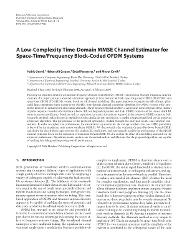| dc.contributor.author | Şenol, Habib | |
| dc.contributor.author | Çırpan, Hakan Ali | |
| dc.contributor.author | Panayırcı, Erdal | |
| dc.date.accessioned | 2019-06-27T08:06:56Z | |
| dc.date.available | 2019-06-27T08:06:56Z | |
| dc.date.issued | 2006 | |
| dc.identifier.issn | 1110-8657 | en_US |
| dc.identifier.uri | https://hdl.handle.net/20.500.12469/1246 | |
| dc.identifier.uri | https://doi.org/10.1155/ASP/2006/39026 | |
| dc.description.abstract | Focusing on transmit diversity orthogonal frequency-division multiplexing (OFDM) transmission through frequency-selective channels this paper pursues a channel estimation approach in time domain for both space-frequency OFDM (SF-OFDM) and space-time OFDM (ST-OFDM) systems based on AR channel modelling. The paper proposes a computationally efficient pilot-aided linear minimum mean-square-error (MMSE) time-domain channel estimation algorithm for OFDM systems with transmitter diversity in unknown wireless fading channels. The proposed approach employs a convenient representation of the channel impulse responses based on the Karhunen-Loeve (KL) orthogonal expansion and finds MMSE estimates of the uncorrelated KL series expansion coefficients. Based on such an expansion no matrix inversion is required in the proposed MMSE estimator. Subsequently optimal rank reduction is applied to obtain significant taps resulting in a smaller computational load on the proposed estimation algorithm. The performance of the proposed approach is studied through the analytical results and computer simulations. In order to explore the performance the closed-form expression for the average symbol error rate (SER) probability is derived for the maximum ratio receive combiner (MRRC). We then consider the stochastic Cramer-Rao lower bound(CRLB) and derive the closed-form expression for the random KL coefficients and consequently exploit the performance of the MMSE channel estimator based on the evaluation of minimum Bayesian MSE. We also analyze the effect of a modelling mismatch on the estimator performance. Simulation results confirm our theoretical analysis and illustrate that the proposed algorithms are capable of tracking fast fading and improving overall performance. Copyright (C) 2006 Hindawi Publishing Corporation. All rights reserved. | en_US] |
| dc.language.iso | eng | en_US |
| dc.publisher | Hindawi Publishing Corporation | en_US |
| dc.rights | info:eu-repo/semantics/openAccess | en_US |
| dc.subject | N/A | en_US |
| dc.title | A low-complexity time-domain MMSE channel estimator for space-time/frequency block-coded OFDM systems | en_US |
| dc.type | article | en_US |
| dc.relation.journal | Eurasip Journal On Applied Signal Processing | en_US |
| dc.department | Fakülteler, Mühendislik ve Doğa Bilimleri Fakültesi, Bilgisayar Mühendisliği Bölümü | en_US |
| dc.department | Fakülteler, Mühendislik ve Doğa Bilimleri Fakültesi, Elektrik-Elektronik Mühendisliği Bölümü | en_US |
| dc.identifier.wos | WOS:000242084800001 | en_US |
| dc.identifier.doi | 10.1155/ASP/2006/39026 | en_US |
| dc.identifier.scopus | 2-s2.0-33746583215 | en_US |
| dc.institutionauthor | Şenol, Habib | en_US |
| dc.institutionauthor | Panayırcı, Erdal | en_US |
| dc.institutionauthor | Çevik, Mesut | en_US |
| dc.relation.publicationcategory | Makale - Uluslararası Hakemli Dergi - Kurum Öğretim Elemanı | en_US |
















